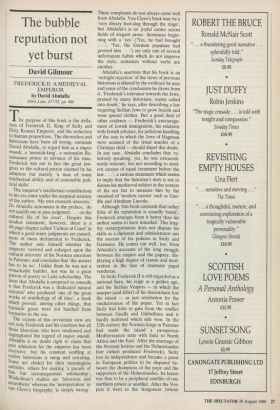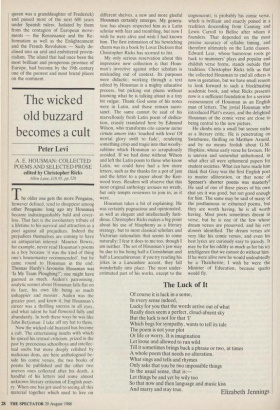The bubble reputation not yet burst
David Gilmour
FREDERICK II: A MEDIEVAL EMPEROR by David Abulafia Allen Lane, £17.95, pp. 466 The purpose of this book is the defla- tion of Frederick II, King of Sicily and Holy Roman Emperor, and his reduction to human proportions. The chroniclers and historians have been all wrong, contends David Abulafia, to regard him as a stupor mundi, a 'messiah-king', a rationalist Re- naissance prince in advance of his time. Frederick was not in fact the great law- giver or the cultural patron claimed by his admirers but merely 'a man of some Intellectual ability and of reasonable poli- tical skills'.
The emperor's intellectual contributions to his era come under the sceptical scrutiny of the author. 'My own research interests,' Dr Abulafia announces in the preface, 'do not qualify me to pass judgment . . . on the cultural life of his court'.. Despite this modest statement, however, there is a 40-page chapter called 'Culture at Court' in which a good many judgments are passed, most of them detrimental to Frederick. The author asks himself whether the emperor 'revived and enlarged upon the cultural interests' of his Norman ancestors In Palermo, and concludes that 'the answer has to be no'. Unlike them he was not a remarkable builder, nor was he a great patron of poetry or Latin scholarship. The most that Abulafia is prepared to concede is that Frederick was a 'dedicated natural scientist' who produced 'one of the great works of ornithology of all time', a book which proved, among other things, that barnacle geese were not hatched from barnacles in the sea.
The victims of this revisionist view are not only Frederick and his courtiers but all those historians who have swallowed and regurgitated the legend of stupor mundi. Abulafia is no doubt right to claim that past adulation for the emperor has been excessive, but his constant scoffing at earlier historians is smug and irritating. Some are chided for their meaningless subtitles, others for making 'a parade of fine but inconsequential scholarship'; Winkelman's studies are 'laborious and anaesthetic' whereas the 'interpretation' in van Cleve's biography 'is simply wrong'.
These complaints do not always come well from Abulafia. Van Cleve's book may be a 'very dreary foot-slog through the reign', but Abulafia's is no joyful canter across fields of elegant prose. Sentences begin- ning with a 'yes' (`Yes, he had brought . . 'Yes, the German populace had greeted him . . .') are only one of several unfortunate habits which do not improve the style; sentences without verbs are another.
Abulafia's assertion that his book is an `outright rejection' of the views of previous historians is diluted by the evidence he uses and some of the conclusions he draws from it. 'Frederick's tolerance towards the Jews, praised by many historians, seems called into doubt,' he says, after describing a law requiring Sicilian Jews to grow beards and wear special clothes. But a good deal of other evidence — Frederick's encourage- ment of Jewish immigration, his relations with Jewish scholars, his judicious handling of the case in which the Jews of Hagenau were accused of the ritual murder of a Christian child — should dispel this doubt. In any case, Abulafia concludes that 're- latively speaking, yes, he was extraordi- narily tolerant, but not according to mod- ern canons of equal treatment before the law . . .', a curious statement which seems to imply that the historian's duty is not to discuss his mediaeval subject in the context of his era but to measure him by the standard of 'modern canons' such as Gan- dhi and Abraham Lincoln.
Although 'this book contends that rather little of his reputation is soundly based', Frederick emerges from it better than his author seems to have intended. This leng- thy reinterpretation does not dispute his skills as a diplomat and administrator nor the success of his policies in Sicily and Germany. He comes out well, too, from Abulafia's accounts of the long struggle between the empire and the papacy, dis- playing a high degree of reason and mod- eration in the face of insensate papal vendettas.
In Sicily Frederick II is still regarded as a national hero, his reign as a golden age, and the Sicilian Vespers — in which the usurper (and killer) of his descendants lost the island — as just retribution for the vindictiveness of the popes. Yet in fact Sicily had little to gain from the conflict between Guelfs and Ghibellines and it hardly mattered which side won. In the 12th century the Norman kings in Palermo had made the island a prosperous Mediterranean state with links to North Africa and the East. After the marriage of the Norman heiress and the Hohenstaufen heir (which produced Frederick), Sicily lost its independence and became a pawn in European politics to be disputed be- tween the champions of the pope and the supporters of the Hohenstaufen. Its future was thus to be a peripheral satellite of one northern power or another. After the Ves- pers it went to the Aragonese (whose queen was a granddaughter of Frederick) and passed most of the next 600 years under Spanish rulers. Isolated by them from the contagion of European move- ments — the Renaissance and the Rc- formation as well as the Enlightenment and the French Revolution — Sicily de- clined into an and and embittered provin- cialism. The island that had once been the most brilliant and prosperous province of Europe, had become by the 19th century one of the poorest and most brutal places on the continent.























































 Previous page
Previous page